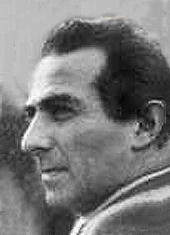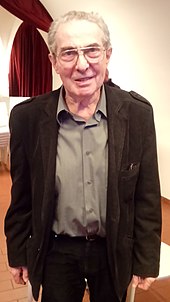Karol Modzelewski
Karol Cyryl Modzelewski , maiden name Cyryl Budniewicz (born November 23, 1937 in Moscow , † April 28, 2019 in Warsaw ) was a Polish historian , writer and politician .
Life
He was born Cyryl Budniewicz, son of an ensign in the Soviet Army and Natalie Wilder, a literary scholar. After Budniewicz's father was arrested and sentenced to eight years in a forced labor camp, his mother linked up in 1939 with the Polish communist Zygmunt Modzelewski , who had just been released from political custody and who adopted little Cyryl. In 1945 Zygmunt Modzelewski became Ambassador of the Republic of Poland to the USSR, 1945–1947 Undersecretary of State in the Ministry of Foreign Affairs , 1947–1951 Foreign Minister. The young Karol had only learned Polish since 1945 and was brought up to be a communist.
After graduating from high school in 1954, he studied history ( medieval studies ) at the University of Warsaw , among others with Aleksander Gieysztor . Professor at the Universities of Wroclaw and Warsaw , he was a member of the Polish United Workers' Party / PVAP , but was expelled in 1964 because of opposition to party politics. He and Jacek Kuroń wrote an open letter to the party for which he was sentenced to 3½ years in prison. He also took part in the March 1968 riots in Poland and was again sentenced to 3½ years in prison for his activities. During the August 1980 strike in Poland , he was the inventor of the name Solidarność / Solidarity for the new union. He maintained contacts with the press and other members in Silesia for Solidarność . Like many others, he was interned under martial law . From 1987 to 1992 he worked at the Instytut Historii PAN in Wroclaw. 1989–1991 he was a member of the Polish Senate , he supported the Unia Pracy and later Włodzimierz Cimoszewicz .
In 2007 Modzelewski received the Polish Academy of Sciences Prize for some of his historical research. In his work Barbarzyńska Europa, Modzelewski emphasizes the “barbaric roots” of Europe, i.e. the proportion of Germanic and Slavic peoples in the period of upheaval of the Great Migration and the Early Middle Ages . These have often been neglected in favor of focusing on the Greco-Roman and Christian heritage.
In 2011, his memory book Zajeździmy kobyłę historii - wyznania poobijanego jeźdźca ('We will ride the mare of history to death - confession of a blue-beaten rider') was published. The title is freely quoted from Mayakovsky . The book was awarded the Kazimierz Moczarski Prize in 2014 and the Nike Literature Prize. He was a full member of the Polish Academy of Sciences.
In June 2016 Modzelewski received the French Order of the Legion of Honor with the rank of knight "as one of the leading personalities in the fight for democracy in Poland" .
Works (selection)
- with Jacek Kuroń: monopoly socialism. Open letter to the Polish United Workers' Party . Hoffmann and Campe, Hamburg 1969.
- The barbaric Europe. On the social order of Teutons and Slavs in the early Middle Ages. fiber, Osnabrück 2011, ISBN 978-3-938400-66-1 . (Original edition under the title Barbarzyńska Europa. Warszawa 2004)
- Zajeździmy kobyłę historii. Wyznania poobijanego jeźdźca. Wydawnictwo "Iskry", cop., Warszawa 2013, ISBN 978-83-244-0335-6 .
- Whither from Communism? ed. by Hartmut Kühn. BasisDr., Berlin 1996, ISBN 3-86163-072-9 .
Web links
- Literature by and about Karol Modzelewski in the catalog of the German National Library
- Literature by and about Karol Modzelewski in the bibliographic database WorldCat
- Modzelewski, Karol in the Polish Personal Database
- Biography in encyklopedia-solidarnosci.pl (Polish)
- Modzelewski's article from Gazeta Wyborcza 2006 (Polish)
- Kuron and Modzelewski's open letter to the party ( memento of April 4, 2008 in the Internet Archive ) (Polish)
- Karol Modzelewski at the Herder Institute
- Red Prince on a noble astray , detailed obituary at Radiodienst Polska
Individual evidence
- ↑ . Jacek Kuroń, Karol Modzelewski: Monopoly Socialism. Open letter to the Polish United Workers' Party . Hamburg 1969.
- ↑ L'Europe des barbaren
- ↑ Iskry
- ^ Kazimierz Moczarski Prize
- ↑ Interia.pl accessed on January 3, 2017
| personal data | |
|---|---|
| SURNAME | Modzelewski, Karol |
| ALTERNATIVE NAMES | Modzelewski, Karol Cyryl (full name); Cyryl Budniewicz (maiden name) |
| BRIEF DESCRIPTION | Polish historian, writer and politician |
| DATE OF BIRTH | November 23, 1937 |
| PLACE OF BIRTH | Moscow |
| DATE OF DEATH | April 28, 2019 |
| Place of death | Warsaw |

